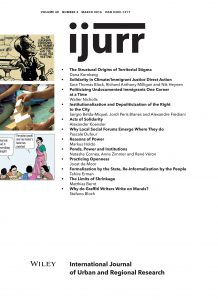Is there a long-term impact of social background on graduates’ careers?
by Marita Jacob & Marcus Klein · Published · Updated

It is a well-known finding that children’s social background affects their educational attainment. But does parental background still matter for attaining a more prestigious job after graduating from university?
In a recently published article, we examined graduates’ occupational trajectories to identify a potential long-term impact of social background on individuals’ working careers. We argued that the influence of family background on graduates’ careers might vary across the life course, and it is, therefore, important to take into account changes across the working career. Initial differences in occupational attainment between individuals from different social backgrounds may perpetuate or even increase over the life course. But occupational trajectories may also converge if work experience, career developments, and achievements compensate for initial disadvantages of those from poorer socio-economic backgrounds.
Given the increasing share of degree-holders in the UK (and elsewhere) graduate characteristics such as the field of study may have become more important for job allocation procedures. Graduates from different fields clearly have diverse occupational opportunities, enter labour markets with distinct characteristics, and thus experience various forms of career progression. In some areas (e.g., humanities and arts), graduates transition to somewhat volatile labour markets with a lot of job-hopping at labour market entry while graduates in other fields (e.g., science, technology, engineering and mathematics (STEM)) have more stable occupational careers or greater chances of occupational upward mobility.
Due to their rather unspecific skills and vague occupational profiles, we expected social inequalities in occupational attainment to be higher in humanities and arts at labour market entry as parental resources may compensate for initial disadvantages in the job search. For graduates in the social sciences, we assumed that inequalities by social background in access to prestigious positions might even increase across graduates’ career. This is because graduates from advantaged social backgrounds acquired social and soft skills in their upbringing that may be particularly valuable in higher services and managerial positions. By contrast, graduates in STEM fields gain occupation-specific skills and enter more distinct occupational positions. Consequently, there may be less leeway for parental resources to impact job allocation at labour market entry and later career stages.
To examine social inequalities in graduates’ occupational careers, we analysed data from the 1970 British Cohort Study. These data allowed us to observe occupational trajectories of degree-holders in the UK over a time-span of 10 years since their labour market entry. We measured parental background as the highest social class among parents based on the National Statistics Socio-Economic Classification. Occupational prestige was measured using the Standard International Occupational Prestige Scale and reflects the social standing of incumbents in the occupational hierarchy.
Our results indicate that there is a small association between parental class and occupational prestige at labour market entry that vanishes across the working career. When differentiating between fields, we only find parental class differences in occupational prestige for graduates in the social sciences but not for graduates in humanities, arts, and STEM fields. Hence, contrary to our expectations, we did not find significant social inequalities in occupational attainment among graduates from humanities and arts. For graduates in the social sciences, we found social class differences in occupational prestige at labour market entry and the early stages of the career. Working-class graduates in these fields overcome this initial disadvantage and catch up with their peers from higher-class backgrounds eight years after graduation, a finding at odds with our expectations.
Our results are restricted to the outcome of occupational prestige and do not exclude the possibility of social inequalities in graduates’ wages when attaining the same occupation (see e.g Sam Friedman and Daniel Laurison (2019). However, an analysis of the influence of social background on graduates’ wage trajectories across the life course has yet to be conducted. At least when it comes to occupational mobility, the answer to the question of whether there is a long-term impact of social background on graduates’ careers is no, not much at all.
Read the authors’ full Open Access research paper in the British Journal of Sociology, here.
Authors
Marita Jacob is Professor of Sociology at University of Cologne, Germany.
Markus Klein is a Senior Lecturer in Human Development and Education Policy in the School of Education, University of Strathclyde, Scotland, UK.





1467-7660/asset/DECH_right.gif?v=1&s=a8dee74c7ae152de95ab4f33ecaa1a00526b2bd2)